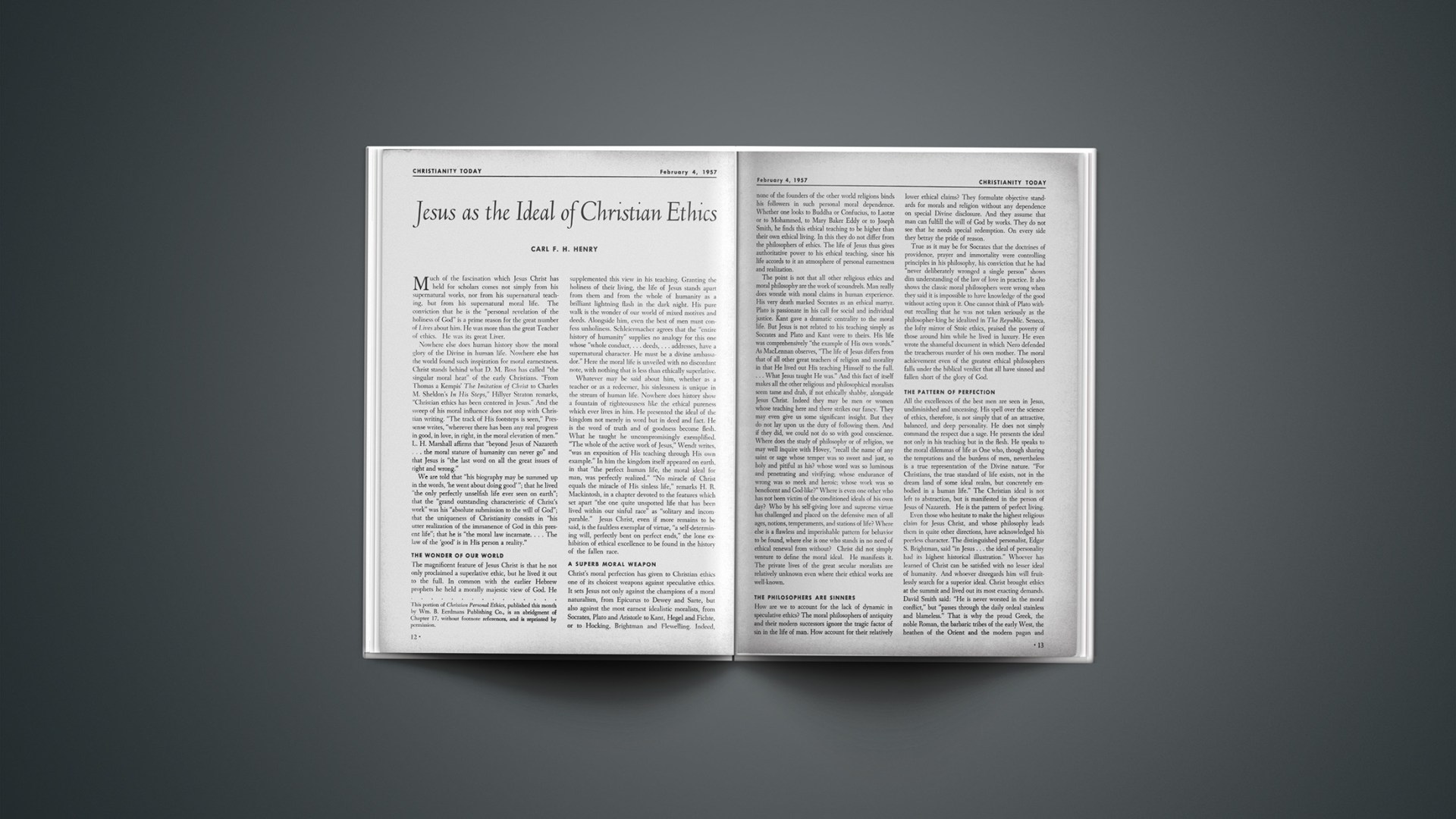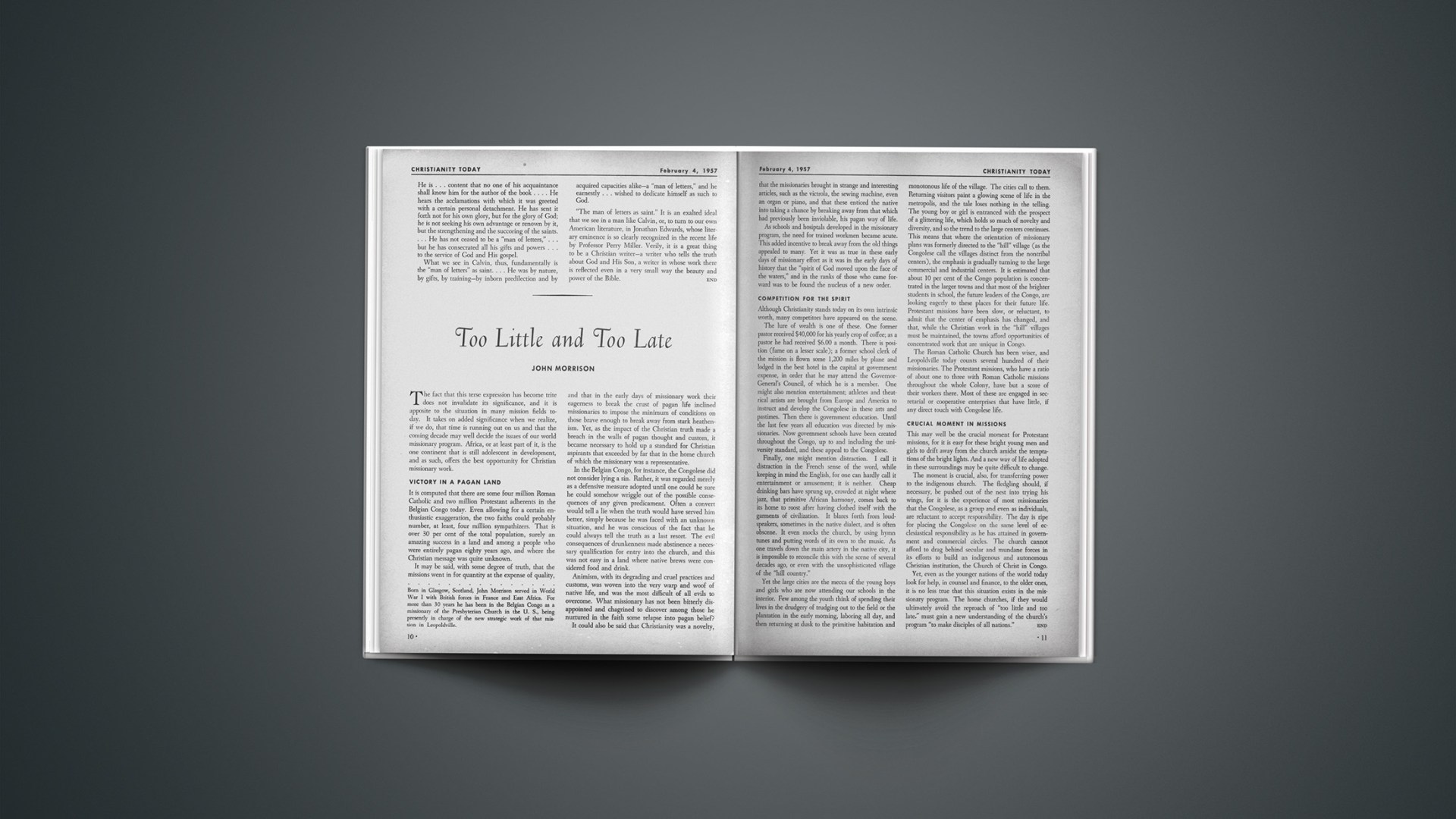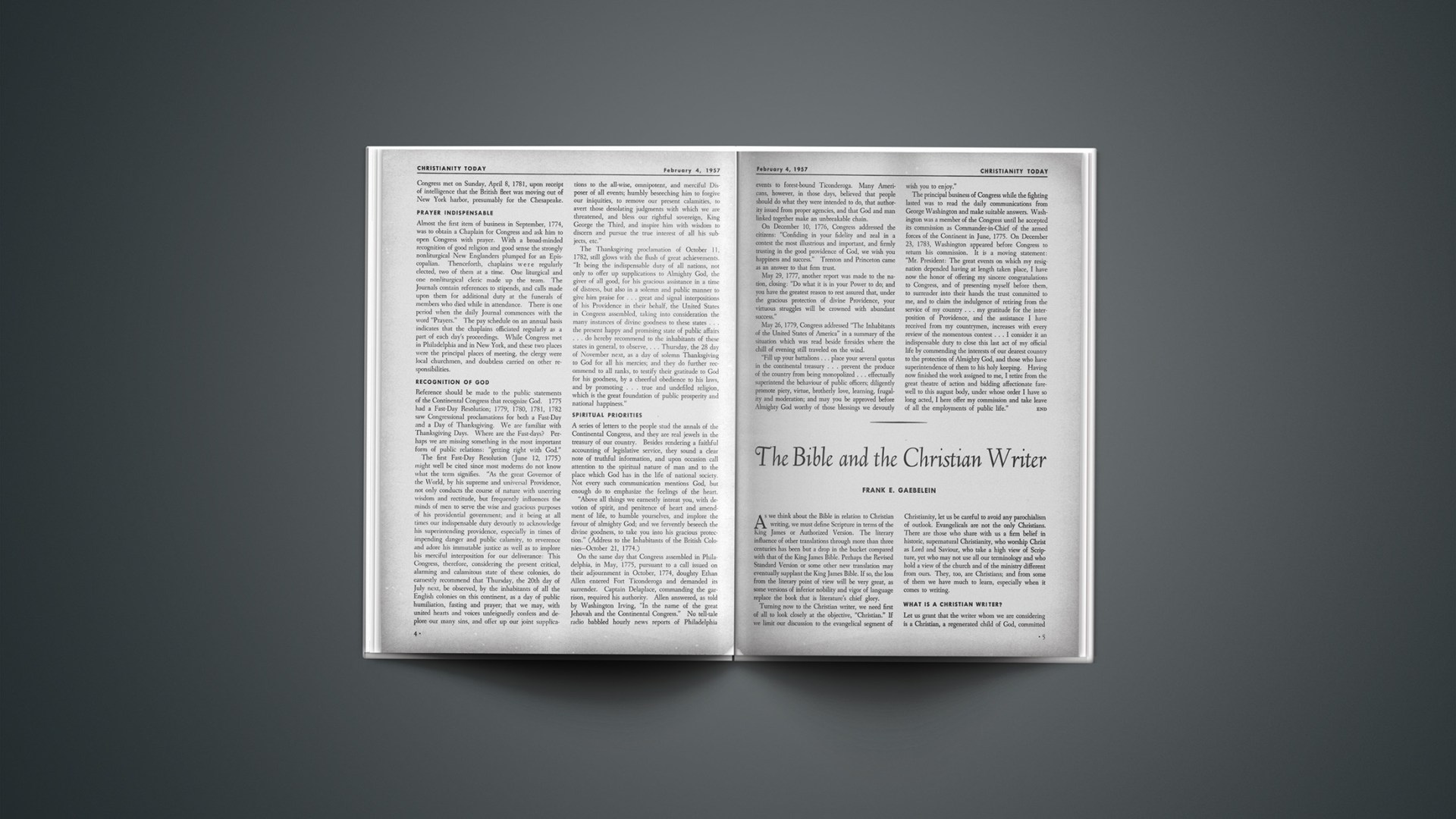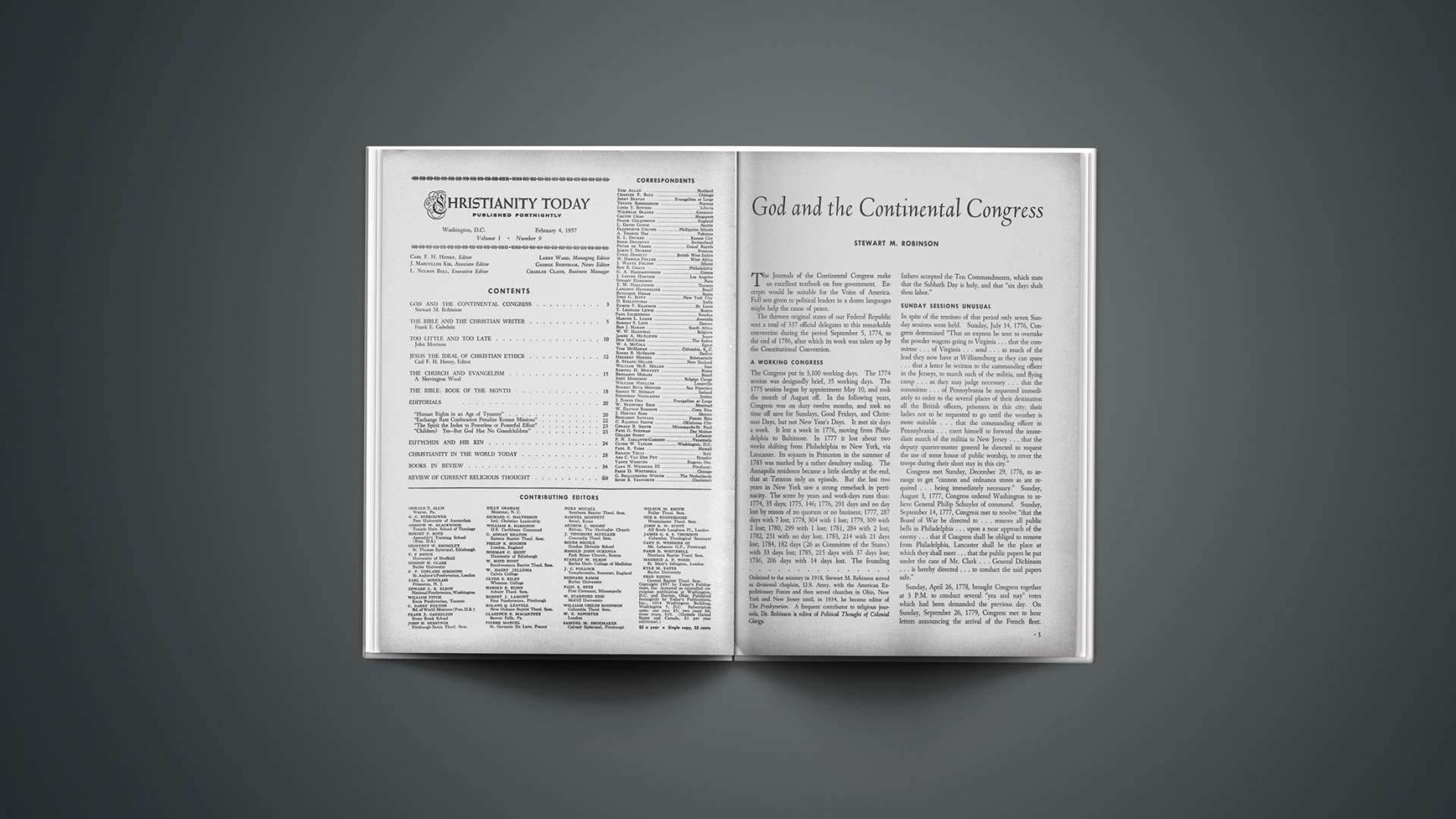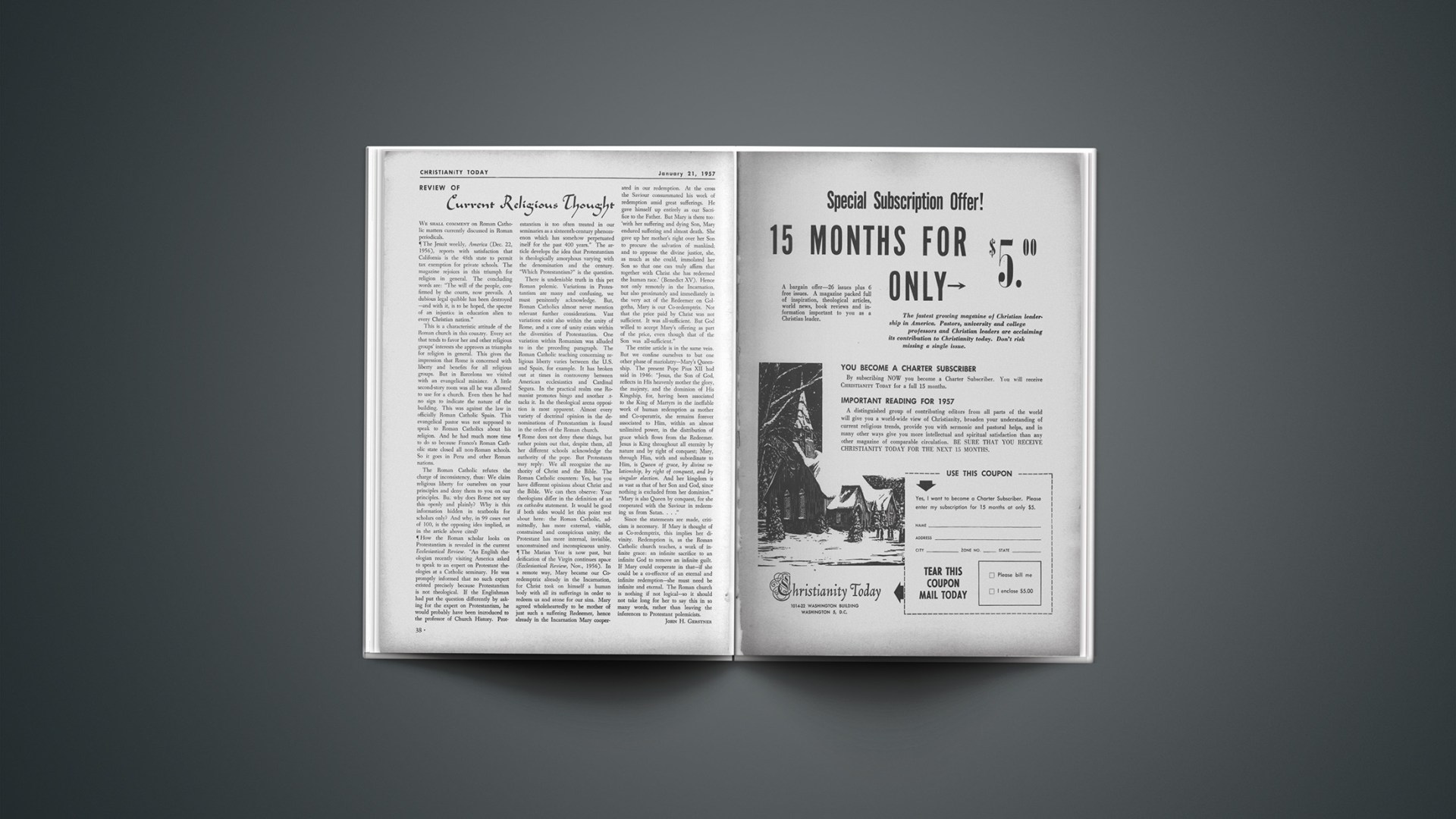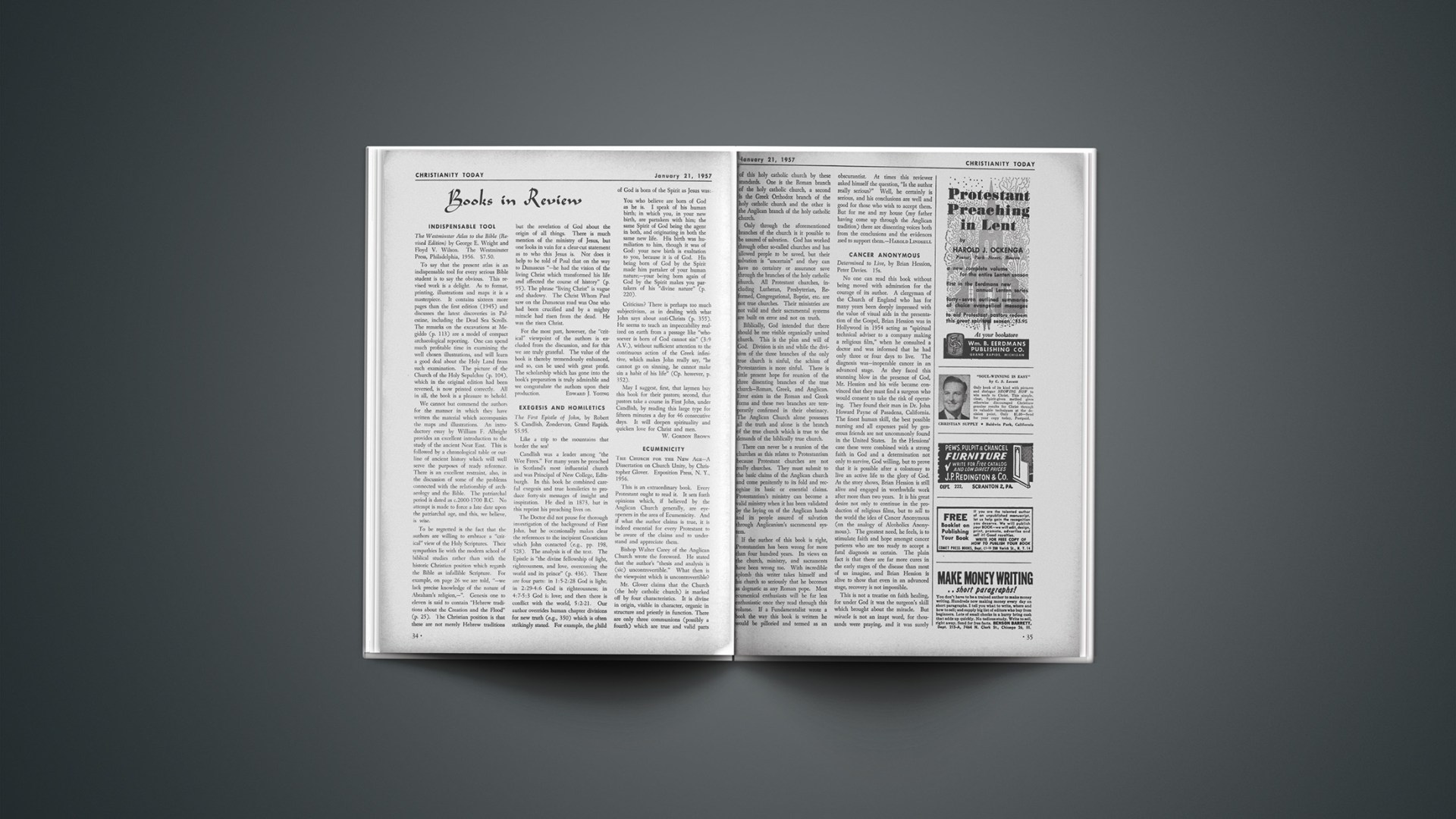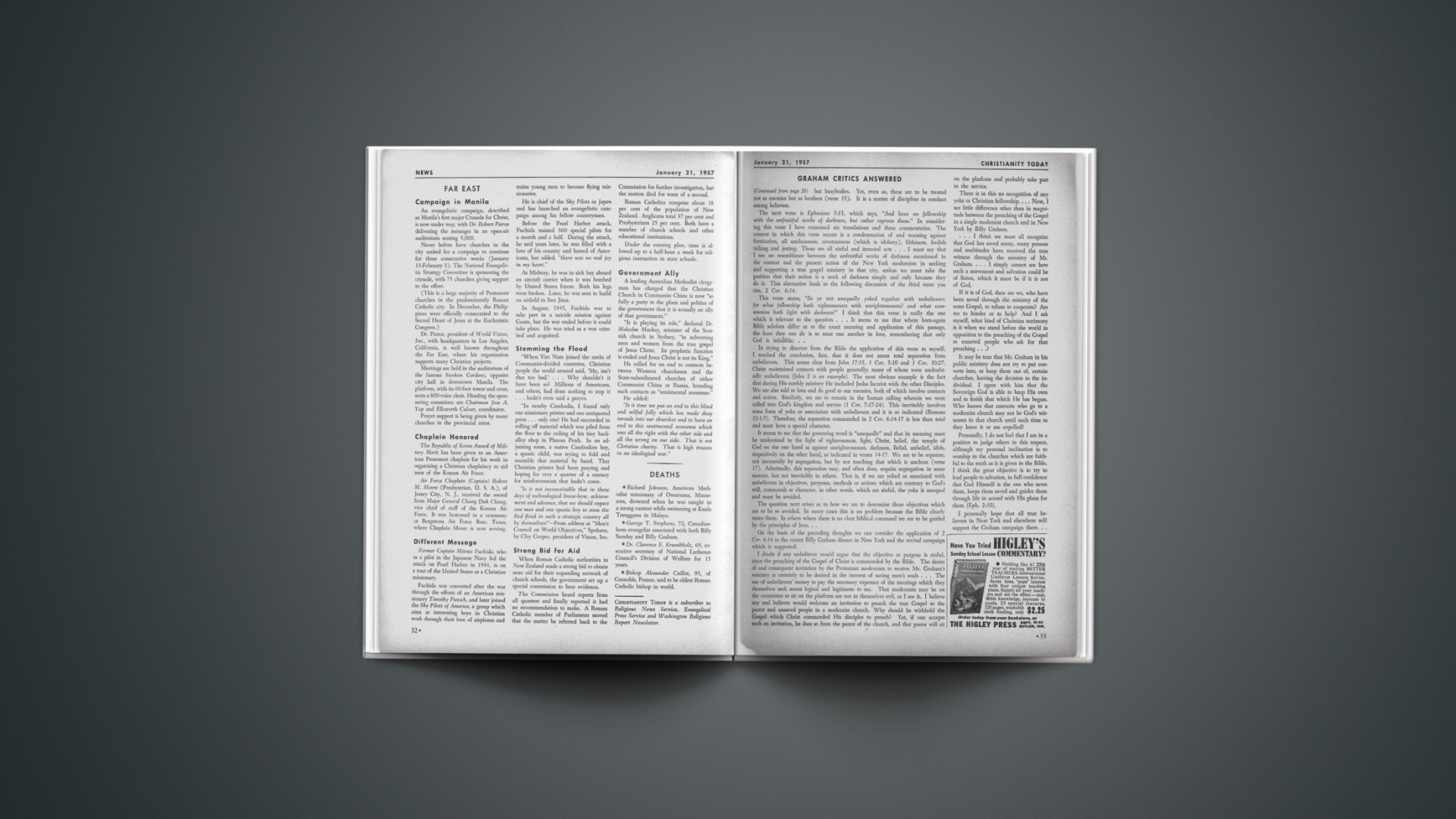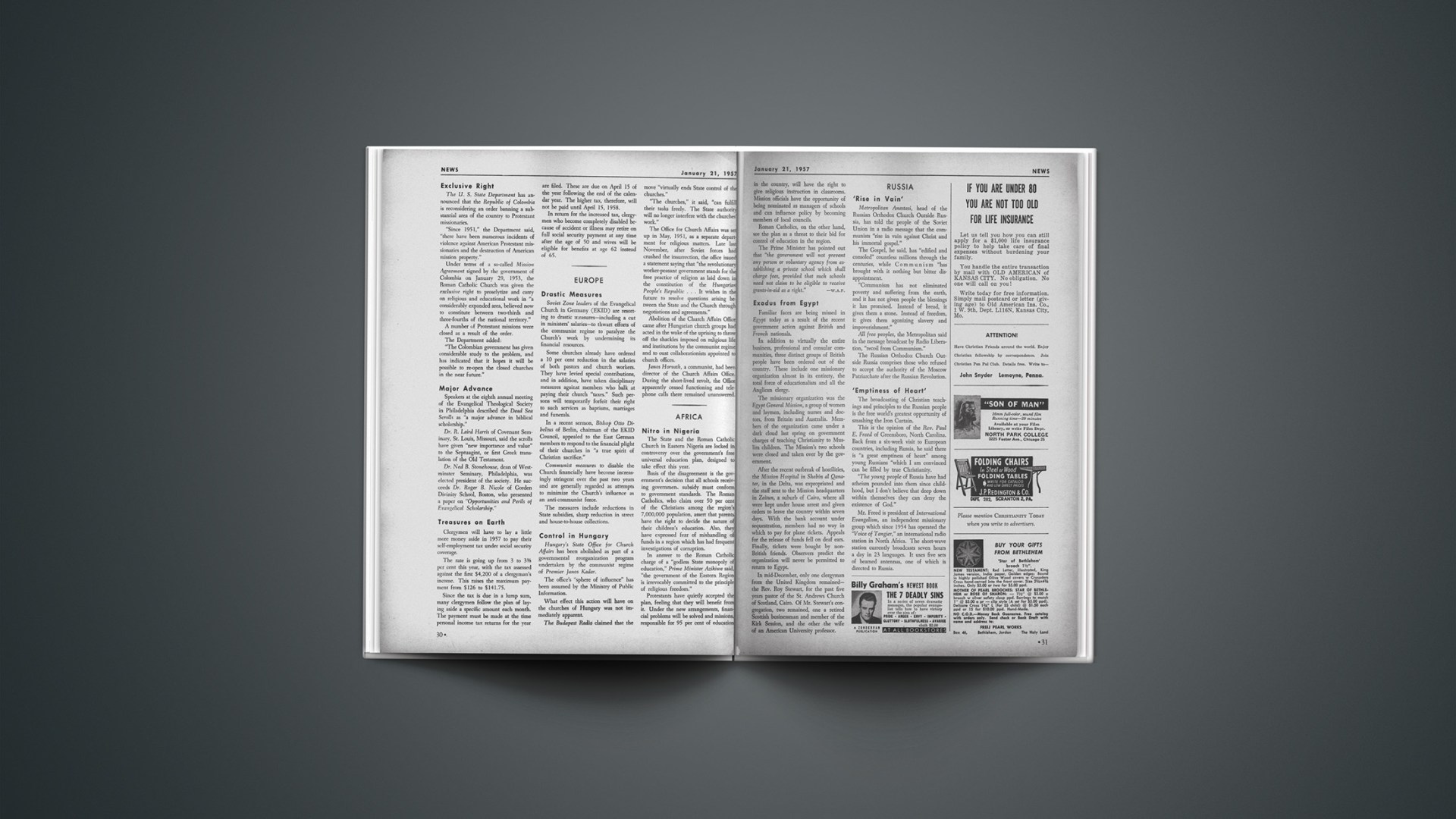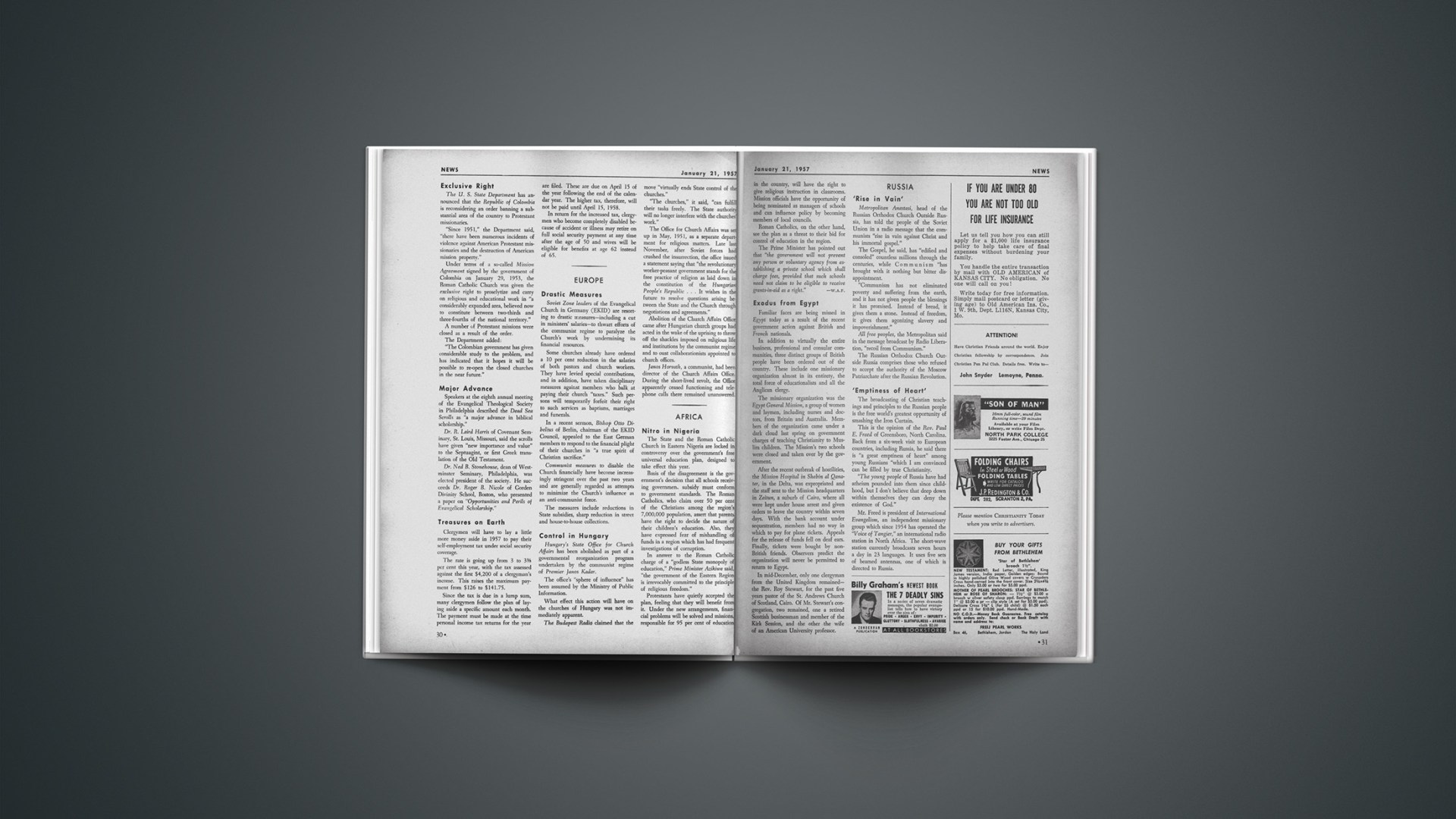One of the significant features of the Christian situation today is the awakening consciousness of the church to the claimant challenge of evangelism. There was a time, and that not so very long ago, when evangelism, in Professor James Denney’s phrase, was “the disinterested interest” of a comparative few. But now it is taking its rightful place at the head of the church’s priorities. It has become, as the Bishop of Rochester has recently pointed out, “a live and foremost issue in the outlook, planning and strategy of the whole church.” We have, therefore, a new climate ecclesiastically for evangelism.
Technique Not The Secret
Much has been written of late concerning the technique of evangelism. It is indeed an encouraging sign of our times that so much attention should be paid to this vital subject. But perhaps the hour has struck for a warning to be issued against the perils involved in too great a reliance upon method. It is the temptation of this pragmatic age to presume that technique is the secret of evangelism. It cannot be too firmly emphasized, however, that mere methods, mere schemes, mere endeavors will not in themselves produce the desired effect. Without the tide of the Holy Spirit running through them they may prove as futile as the frenzied activism of Elijah’s rivals on Mount Carmel. “And they cried aloud, and cut themselves after their custom with swords and lances, until the blood gushed out upon them. And as midday passed, they raved on until the time of the offering of the oblation, but there was no voice; no one answered, no one heeded” (1 Kings 18:28,29, R.S.V.). Method is of secondary importance compared with the primacy of the Spirit and the Word.
It is the purpose of this article to underline certain basic principles relating to the church and evangelism rather than to add to the existing pile of literature on method. And working as I am at the present moment with the “Tell Scotland” movement, perhaps I may be forgiven for utilizing the threefold statement that underlies this great nationwide campaign. Expressed in the words of its leader, Tom Allan, effective evangelism today stems from the conviction “that mission is a continuing engagement with the world at every level; that the true agent of mission is the Church itself; and that the layman has a decisive part to play.”
Engagement With The World
The question of the world is one that should continually exercise the believer’s mind, but not always in the traditional sense. It is, of course, essential that the young convert should clearly separate himself from all that would distract or defile. But once his stand has been made and he is firm on the rock and strong in Christ, then, as the familiar hymn reminds us, he must
“… stretch out a loving hand
To wrestlers with the troubled sea.”
And just as the would-be rescuer must often plunge into the dangerous waters in order to save a sinking man, so the Christian is called upon to risk contamination himself in order to win another out of the world. Remember, it was the Pharisees who drew in their skirts at the sight of the wicked and passed by on the other side. The Son of man was known as “a friend of publicans and sinners” (Matt. 11:19).
Now it is out of this Scriptural attitude that the realisation arises that evangelism is an engagement with the world. Christianity does not represent a flight from the world. That is the choice of the recluse and the ascetic, but it is not the directive of God’s Word. Our Lord’s parting commission, before his ascension to the right hand of the Father on high, was “Go ye into all the world, and preach the Gospel to every creature” (Mark 16:15). In obedience to that explicit command of Christ, the church must seek to be always in the world yet never of it. And this is not to be a matter of special occasions and specific crusade. Evangelism cannot be relegated to the realm of the sporadic and the intermittent. It is the urgent task of the church all the time. It is a “continuing engagement with the world.”
Moreover, it is to be “at every level.” Too often our evangelism is limited in both conception and scope. We tend to restrict it to stereotyped patterns. We have lost the improvising genius of the New Testament Church. Writing to the Corinthians, St. Paul gives us a glimpse of his own evangelistic strategy. “I have become all things to all men,” he says, “that I might by all means save some” (1 Cor. 9:22). When the passion for souls fully dominates our discipleship, then we shall not rest content until every avenue of approach to the unconverted has been explored. We shall covet the beatitude of Isaiah 32:20, “Blessed are ye that sow beside all waters.”
The Christian Commando campaigns in Great Britain in the immediate postwar years adopted such a policy. They aimed to penetrate deep into enemy lines and to occupy a bridgehead until the regular troops of the church came. Meetings were held wherever men and women were—in factories, in shops, in cinemas, in dance halls, in public houses, in schools, in clubs and in the open air. Instead of waiting for unbelievers to come to the church to hear the message of salvation (and it might well have been a lengthy interval), the church went to them and confronted them with the Word just where they were. Such a policy must be incorporated into the regular program of every local church. Continuing engagement with the world at every level must be integral to the church.
The Agent Of Mission
A further principle of vital evangelism is that “the true agent of mission is the church itself.” Never before has the church been so closely linked with evangelism at the receiving end. We live in the era of church-centered crusades. It used to be said that too many campaigns failed because they halted on the church doorstep. That is no longer the case. Every possible effort is made in follow-up procedure to channel inquirers into the fellowship of the church.
This reorientation of evangelistic objective brings with it a fresh challenge to the church. It is not sufficient that the actual task of mission should be left to itinerant specialists, valuable though their contribution may be. The harvest truly is plenteous, but the laborers are sadly few. We must therefore pray the Lord of the harvest that He will send forth laborers into His harvest (Matt. 9:37, 38). And the answer to our prayer will be “Go ye.” We shall realise that evangelism is a task for the whole church, and that includes every believer. We cannot conveniently beg off this concern. When the prophet Isaiah heard the voice of the Lord saying, “Whom shall I send, and who will go for us?” he responded immediately and unhesitatingly, “Here am I: send me” (Isa. 6:8).
We have spoken of the change of attitude whereby the church is now regarded as the natural recipient of converts. There is desperate need for a parallel revolution within the church. Our eyes must be opened to see both our responsibility and opportunity. If we are to fulfill our function in the world by becoming the agent of evangelism, we must be ready for new and unusual ventures in Christ’s name. We must refuse to be fenced in by conventional inhibitions. Over the centuries, sadly enough, the church has built up defences that all too often hem her in, as well as keep the enemy out. God may well be saying to us as He said to Israel of old, “Take away her battlements; for they are not the Lord’s” (Jer. 5:10).
If the church is indeed the agent of mission, then a radical overhaul of our machinery is necessary. Every item must be reassessed in terms of its evangelistic value. The policy of the local church must be evangelistic. Evangelism must be the very air we breathe, the very blood that runs through our veins. So many churches apparently have no policy, spiritually speaking, at all. They are content to drift along from day to day, from week to week, from month to month, from year to year with no evident end in view. No political party would dream of dispensing with a program. No business firm could continue without a clear-cut plan of action. Yet too often in the Christian Church we think that anything will do. We must have a policy and that policy must be evangelistic. We must have a burden for the unsaved. We must have a consuming hunger for souls.
The activity of the local church must be evangelistic. Everything we do on our premises must be related to the task of mission. If need be, we must scrutinize our timetable to ensure that all is done for the furtherance of the Gospel. Every meeting and every organisation must be weighed in this balance and fearlessly dealt with if it is found wanting. The tree will be all the healthier when the branches are pruned.
The worship of the local church must be evangelistic. Every service must be designed to confront the congregation with the claims of Jesus Christ. Every sermon must aim at decisions. What Principal W. M. Macgregor used to call “the preaching of conquest” must return to the pulpit. We must expect conversions, for unless we expect them we shall not see them. And beyond the normal activity and worship of the church, every attempt must be made to reach out to those who are estranged from Christ—especially those resident within the vicinity. All this is implied by the affirmation that “the true agent of mission is the Church itself.”
The Layman’S Part
The final principle of evangelism enunciated by the “Tell Scotland” movement is that “the layman has a decisive part to play.” One of the “Signs of Hope in a Century of Despair” listed by Professor Elton Trueblood in a stimulating book of that title, is what he calls the emergence of lay religion. Such an heartening feature must be capitalized in the interests of evangelism. The growing consciousness within the church of the role of the laity must be harnessed to the task of mission.
This is an unequivocal implication of the doctrine of the priesthood of all believers. This Protestant insistence is itself derived from Holy Scripture. The Christianity of the Bible is a layman’s movement. Among the twelve whom Christ chose to receive and perpetuate His message not one was a rabbi or a priest. They were all to be found in the ordinary walks of life. Some were fishermen and one was a tax collector. It was to these men, drawn as they were from the common cross section of society, that our Lord issued his clarion call to witness: “Follow me, and I will make you fishers of men” (Matt. 4:19).
Christ is calling laymen still to play a decisive part in the work of evangelism. And if they hesitate on the grounds of inadequacy, they should ponder the second verb in the verse quoted above. It contains the open secret of power for witness. “I will make you.” The disciples were the men Jesus made. It was not what they were that equipped them for their mission, but what he made of them. He who tamed the impetuous Peter until he was known as the apostle of humility; he who enabled the reticent Andrew to become the first home missionary; he who so resolved the dilemmas of doubting Thomas that at last he owned his Lord and his God—this same living Christ can transform the lowliest believer into an ambassador of love.
The layman has a decisive part to play in personal evangelism. In these days of great crusades and mass meetings we tend to overlook the abiding need for the quiet yet fruitful witness of the individual. But in point of fact this is the basis of every sort of evangelism. It is the original New Testament technique. Andrew brings Peter. Philip brings Nathaniel. That was how the Church grew when it was very young. That is how it will still grow today. Obviously, the layman is central here. It is the duty and privilege of every believer to testify to the saving grace of Christ. If our experience is real, it will be evident. If our faith is vital, it will find expression. We shall tell our unconverted friends and neighbors what has happened to us and commend our Saviour to them. We shall say with Paul, “We having the same spirit of faith, according as it is written, I believed and therefore have I spoken; we also believe, and therefore speak” (2 Cor. 4:13).
The layman also has a decisive part to play in team evangelism. Much of the most effective missioning is being done today by groups. They may go out to visit from door to door or witness in the open air. They may constitute a Christian cell within a factory. Such teams are composed of laymen. They may be trained and instructed by ministers, but they are nevertheless in essence a part of the lay potential of the church.
That is a potential awaiting realisation. “The essential thing in the whole matter,” wrote Dr. Hendrik Kraemer, referring to the layman’s part in evangelism, “is that the churches forget that in the lay membership they have the most precious part of the whole body. If the churches awaken to the importance of the laymen and really try, probably for the first time in history, to give content to the doctrine of the general priesthood of all believers, there will be a deep change in our whole church life and in the relation of the church to the world.” It should be the prayer of every Christian that such a profound and far-reaching revolution may take place. A return to the New Testament principles of every-member evangelism is more than overdue.
Having indicated the fundamental convictions underlying the church’s approach to its commitment of mission in the contemporary situation, let it be stated in conclusion that evangelism is not in itself the answer to the church’s needs and problems. Evangelism is not enough. Our further prayer must be for revival. Only the Pentecostal insweeping of the Holy Spirit can make the dead bones live.
Revive us, Lord! Is zeal abating
While harvest fields are vast and white?
Revive us, Lord, the world it waiting,
Equip Thy Church to spread the light.
We Quote:
RUSSELL MAGUIRE
Chairman of the Board, American Mercury
Of paramount importance, we must have a spiritual revival—we must return to a strong belief in God and the Bible.—In a statement of “Objectives for 1957,” American Mercury, Vol. LXXXIV, No. 396 (Jan., 1957).
A. Skevington Wood served Methodist circuits in Scotland from 1940 to 1951, when he became superintendent of Paisley Central Hall where he still ministers. He holds the B.A. from University of London and the Ph.D from University of Edinburgh, where Church History was his major field. His work on Thomas Haweis (1734–1820) is being published this year by S.P.C.K.



